Posted by Elena del Valle on January 6, 2025
This article and interview were created without AI-assisted technologies.
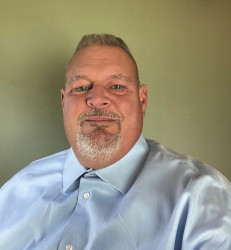
Rodger Mort, COO, Packaging And Crating Technologies
Photo: PACT, LLC
A podcast interview with Rodger Mort, chief operating officer, Packaging And Crating Technologies (PACT), is available in the Podcast Section of Hispanic Marketing and Public Relations, HispanicMPR.com. During the podcast, he discusses safe recycling tips with Elena del Valle, host of the HispanicMPR.com podcast.
Rodger brings 38 years of green packaging experience to his position, initially starting out as an hourly employee and working his way through the ranks of supervisor, plant manager to COO and partner. His specialty is designing cost-effective, patented, crating solutions like LiftVans and PleatWrap, as well as custom packaging for the aerospace, medical, electronics, tooling, machinery, furniture, fine art and automotive sectors. He is responsible for the company’s newest invention, Thermo Shield, a sustainable paper-based packaging material that suppresses and controls lithium ion battery fires by mitigating thermal runaway.
Under his direction, the company is a current member of the Commercial Relocation Network, the Council on Safe Transportation of Hazardous Materials and the International Association of Movers. It is also a preferred vendor for the US Department of Defense and has been awarded a special permit from the United States Department of Transportation for the shipping of lithium-ion batteries, as well as passed the proposed SAE-G-27 test standard.
To listen to the interview, scroll down and click on the play button below. It is also possible to listen by looking for “Podcast” then selecting “HMPR Rodger Mort” and downloading the MP3 file to your audio player. You can also find it on the RSS feed. To download it, click on the arrow of the recording you wish to copy and save it to disk. The podcast will remain listed in the January 2025 section of the podcast archive.
Posted by Elena del Valle on December 16, 2024
This article and interview were created without AI-assisted technologies.
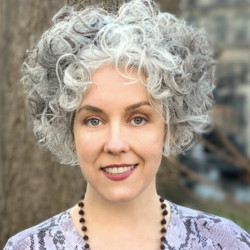
Author Jaya Jaya Myra
Photo: Jaya Jaya Myra
A podcast interview with author Jaya Jaya Myra is available in the Podcast Section of Hispanic Marketing and Public Relations, HispanicMPR.com. During the podcast, she discusses Building Mindful Workplaces to Boost Culture with Elena del Valle, host of the HispanicMPR.com podcast.
Jaya Jaya Myra, is a former immunologist who turned to mind-body wellness. She authored Vibrational Healing and The Soul of Purpose. She is also a TEDx and motivational speaker, as well as the creator of The W.E.L.L. Method for purpose-filled, healthy living. She founded Gita for the Masses, a 501(c)(3) charitable non-profit organization created to help people with conscious character development.
To listen to the interview, scroll down and click on the play button below. It is also possible to listen by looking for “Podcast” then select “HMPR Jaya Jaya Myra” and download the MP3 file to your audio player. You can also find it on the RSS feed. To download it, click on the arrow of the recording you wish to copy and save it to disk. The podcast will remain listed in the December 2024 section of the podcast archive.
Posted by Elena del Valle on December 11, 2024
This article was created without AI-assisted technologies.
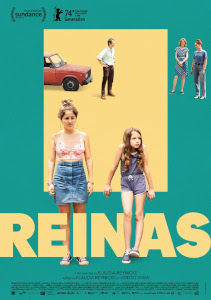
Reinas poster
Photos, video: Outsider Pictures
A 2024 Spanish language film from Switzerland, Peru and Spain Reinas is this year’s Switzerland’s International Film Oscar submission. Set in 1990s Peru the 105-minute film with English subtitles* centers around two sisters and their divorced parents. Driven by a deteriorating political and financial situation in her country Elena (Jimena Lindo) plans to move to Minnesota with Lucia and Aurora, her daughters. In order for them to leave the country Carlos, their absentee father, must sign exit papers. Complications arise as departure time approaches. Scroll down to view a trailer.
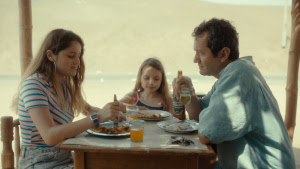
Scene from Reinas with Carlos, Lucia and Aurora
Excellent acting, attention to detail and a credible setting (for someone who has never visited 1990s Peru) made the story immersive. The film received the following recognitions: Winner Best Director, Berlin – Grand Prix, Generations; Winner Audience Award at the Locarno Film Festival; and Official Selection at Sundance. Also starring are Abril Gjurinovic, Gonzalo Molina, Luana Vega and Susi Sanchez. According to promotional materials Klaudia Reynicke-Candeloro, the director, grew up in Lima. The script was by Reynicke-Candeloro and Diego Vega. The producers were Britta Rindelaub, Diego Vega, Valerie Delpierre, Thomas Reichlin and Daniel Vega.

Scene from Reinas with Elena, Lucia and Aurora
Support for the film was from Sundance, Alva Film, Inicia Films, Maretazo Cine, RTS Radio Television Suisse. It was sponsored by Switzerland, Spain, CineForum, Loterie Romande, Department of Culture of Catalunya and Peru among others. Reinas opened in Los Angeles and New York City theaters last month. According to a press release it will be available for online rental and purchase in Spring 2025.
*(the screener was without subtitles)
Posted by Elena del Valle on December 2, 2024
This article and interview were created without AI-assisted technologies.
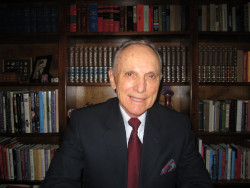
Obie Silverwood, author, Industrial Real Estate Investing and Management
Photo: Obie Silverwood
A podcast interview with Obie Silverwood, author, Industrial Real Estate Investing and Management, is available in the Podcast Section of Hispanic Marketing and Public Relations, HispanicMPR.com. During the podcast, he discusses investing in industrial real estate with Elena del Valle, host of the HispanicMPR.com podcast.
He was employed for five years by the National Cash Register Company, marketing commercial computer systems for accounting application, from which he gained accounting skills. In 1976 he began his commercial real estate brokerage career at the Newport Beach office of Grubb & Ellis. In 1981 he opened a brokerage in Irvine, California, specializing in industrial properties.
According to his bio he has personally transacted millions of square feet of industrial building sales, exchanges and leases, representing clients and for his own portfolio; as well as investing in industrial real estate provided him a multi-million dollar net worth and adequate income to retire from brokerage in his mid-forties; and he has been continuously licensed in good standing as a California Department of Real Estate broker since 1977.
To listen to the interview, scroll down and click on the play button below. It is also possible to listen by looking for “Podcast” then select “HMPR Obie Silverwood” and download the MP3 file to your audio player. You can also find it on the RSS feed. To download it, click on the arrow of the recording you wish to copy and save it to disk. The podcast will remain listed in the December 2024 section of the podcast archive.
Posted by Elena del Valle on November 18, 2024
This article and interview were created without AI-assisted technologies.
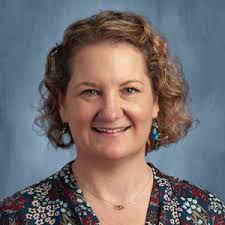
Sarah Schoellkopf, producer, Norita
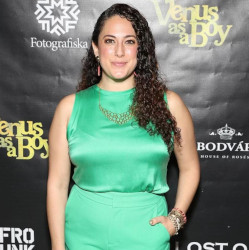
Melissa Daniels, producer, Norita
Photos: Sarah Schoellkopf, Melissa Daniels, Norita Film
A podcast interview with Sarah Schoellkopf and Melissa Daniels, producers, Norita is available in the Podcast Section of Hispanic Marketing and Public Relations, HispanicMPR.com. During the podcast, they discuss Norita with Elena del Valle, host of the HispanicMPR.com podcast.
In addition to her work as a producer Sarah is an academic whose research focuses on human rights and gender. Her doctorate investigated the Mothers of Plaza de Mayo and included field research with the group in the 1990s and 2000s. Sarah co-produced the 2021 documentary Ferguson Rising, which premiered at Tribeca. She founded DoctoraStories in 2022 to connect with creative voices and give voice to marginalized stories. She is a champion of Spanish language education in California and president of the Eileen & Fred Family Schoellkopf Foundation.
Melissa, with over 15 years in journalism and film production, is the founder and executive producer of Tidetivity Studios. According to her bio she is passionate about diverse narratives and creates commercial and original films merging social justice and authentic community representations. Notable projects include NatGeo’s 2023 release The Mission, Hulu’s Venus as a Boy (2021), winner of a Tribeca International Film Festival audience award, and AppleMusic’s 2018 documentary Rainbow: The Film on pop music superstar Kesha.
To listen to the interview, scroll down and click on the play button below. It is also possible to listen by looking for “Podcast” then select “HMPR Sarah Schoellkopf, Melissa Daniels” and download the MP3 file to your audio player. You can also find it on the RSS feed. To download it, click on the arrow of the recording you wish to copy and save it to disk. The podcast will remain listed in the November 2024 section of the podcast archive.
Posted by Elena del Valle on November 13, 2024
This article was created without AI-assisted technologies.
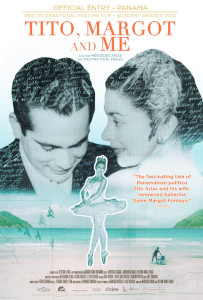
Tito, Margot and Me
Image: IndiePix Films
Tito, Margot and Me, a 92-minute 2021 documentary, in Spanish and English with English subtitles (the screener version provided was in Spanish and English without subtitles), is Panama’s official Oscar Submission for Best International Film. It attempts to paint a picture behind the romance between Margot Fonteyn, a well known ballerina, and Roberto “Tito” Arias, a Panamanian diplomat, who was married and had three children at the time he approached her to propose marriage. According to a public relations spokesperson no one was available to be interviewed. The film “will be available exclusively on IndiePix Unlimited on Amazon Channels” starting November 15, 2024.
Narrated by Mercedes Arias, the couple’s niece who only met them once, the film is made up of family album photos, archival and current videos, interviews and current day images as well as ballet segments performed for the film. While Fonteyn continued to dance until her retirement a shooter left Arias quadriplegic. The film interviews appear to have taken place in Panama, United Kingdom and United States. Two of the interviewees have passed away since they were interviewed. Tito, Margot and Me was winner of the Ibermedia Fund 2019 and the Panama Film Fund.
The documentary was co-directed by Arias and Delfina Vidal, the founder of Betesda Films who works as a director and producer of independent documentaries. She has received two grants from the Panamanian Film Authority to carry out these projects. An example is Case in point: Box 25, a documentary about the construction of the Panama Canal, told through first-person accounts from the men who excavated the Canal in the early 20th century.
Vidal is a director and screenwriter with more than 20 years of experience in film and television production specialized in documentary filmmaking. She directed and produced, with her partner Arias, the documentaries Case in point: Box 25, A Different Day, and Out, la salida está en tu mente. As a university professor, she has taught at the University of Panama, Santa Maria La Antigua University, and the University of the Isthmus.
Posted by Elena del Valle on November 4, 2024
This article and interview were created without AI-assisted technologies.
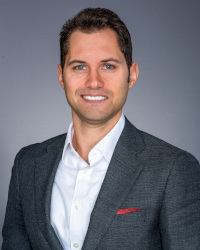
Mario D’Aquila, MBA, COO, Assisted Living Services, Inc.
Photo: Assisted Living Services, Inc.
A podcast interview with Mario D’Aquila, M.B.A., chief operating officer, Assisted Living Services, Inc., is available in the Podcast Section of Hispanic Marketing and Public Relations, HispanicMPR.com. During the podcast, he discusses navigating care options for seniors with Elena del Valle, host of the HispanicMPR.com podcast.
Mario is also co-owner of Assisted Living Services, Inc. in Connecticut, senior vice president of subsidiary Assisted Living Technologies, Inc., and managing member of My Guardian Angel PRS, LLC. He also serves as Chairman of the DSS Medicaid Committee for Home Care Association of America, Connecticut Chapter as well as serves on the Board of Directors for the Connecticut Association for Healthcare at Home.
Mario is responsible for helping Assisted Living Services, Inc. and all affiliated companies look for new ways to grow and to have a positive impact on each company’s long-term future. He has experience with business strategy, mergers and acquisitions, as well as company formation and is responsible for spearheading growth initiatives that placed ALS on the 2020 Inc. 5000 list of fastest growing companies. Mario has previous experience working in project management for mid and large construction companies in Connecticut.
To listen to the interview, scroll down and click on the play button below. It is also possible to listen by looking for “Podcast” then select “HMPR Mario DAquila, MBA” and download the MP3 file to your audio player. You can also find it on the RSS feed. To download it, click on the arrow of the recording you wish to copy and save it to disk. The podcast will remain listed in the November 2024 section of the podcast archive.
Posted by Elena del Valle on October 21, 2024
This article and interview were created without AI-assisted technologies.
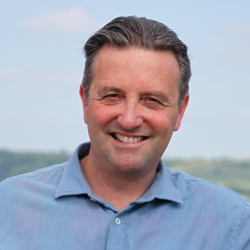
Paul Hargreaves, CEO, Cotswold Fayre
Photo: Cotswold Fayre
A podcast interview with Paul Hargreaves, CEO, Cotswold Fayre, is available in the Podcast Section of Hispanic Marketing and Public Relations, HispanicMPR.com. During the podcast, he discusses beyond B Corp with Elena del Valle, host of the HispanicMPR.com podcast.
Paul is a speaker, author, and B Corp ambassador. He is one of the leading voices in the UK encouraging and inspiring businesses to make a positive impact on the world, strongly believing that businesses should be a Force for Good, which is the title of his first book.
Paul believes that to bring the radical and systemic change required to reverse climate change and the growing inequality in the world a new compassionate, loving and servant-hearted leadership is required. This is what he calls The Fourth Bottom Line, the title of his second book.
To listen to the interview, scroll down and click on the play button below. It is also possible to listen by looking for “Podcast” then selecting “HMPR Paul Hargreaves” and downloading the MP3 file to your audio player. You can also find it on the RSS feed. To download it, click on the arrow of the recording you wish to copy and save it to disk. The podcast will remain listed in the October 2024 section of the podcast archive.
Posted by Elena del Valle on October 7, 2024
This article and interview were created without AI-assisted technologies.

Maria Alejandra Requena, news anchor, Canela News
Photo: Canela Media
A podcast interview with Maria Alejandra Requena, news anchor, Canela News, is available in the Podcast Section of Hispanic Marketing and Public Relations, HispanicMPR.com. During the podcast, she discusses Canela News with Elena del Valle, host of the HispanicMPR.com podcast.
Maria Alejandra is also known as Mariale. She is a communicator with more than 25 years of experience in television, 10 of them on CNN en Español. She was a news anchor for Cafe CNN, the morning show, and Panorama Mundial in Prime Time for an estimated audience of more than 35.1 million people from Argentina to the United States. She received two National Emmy Awards.
Mariale was widowed after 26 years with her first husband. She authored I Choose to Be Happy and Learn to Live Despite Grief hoping to inspire people through her story.
To listen to the interview, scroll down and click on the play button below. It is also possible to listen by looking for “Podcast,” selecting “HMPR Mariale Requena” and downloading the MP3 file to your audio player. You can also find it on the RSS feed. To download it, click on the arrow of the recording you wish to copy and save it to disk. The podcast will remain listed in the October 2024 section of the podcast archive.
Posted by Elena del Valle on September 25, 2024
We have not used AI-assisted technologies in creating this article.
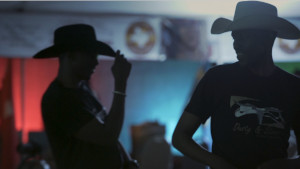
Dusty and Stones
Photo: First Run Features
Thanks to funding from HBO New True Stories Funding Initiative, the Gotham Documentary Feature Lab, Film Independent’s Fast Track, Durban FilmMart, and the XTR Film Society filmmakers followed two struggling country singers from the African Kingdom of Swaziland (now the Kingdom of Eswatini) on a journey from their home country to the United States. The result is Dusty & Stones, an 84-minute First Run Features 2023 documentary release, scheduled to open in theaters in Los Angeles October 11 and Atlanta October 18.
The film centers on cousins Gazi “Dusty” Simelane and Linda “Stones” Msibi in Swaziland and their 10-day road journey to a recording studio in Nashville and a small town in Texas for a country music event. According to the film website Dusty is a high school English teacher at Swaziland’s National High School, and Stones is a construction project manager.
Dusty and Stones was directed and produced by Jesse Rudoy, produced by Melissa Adeyemo, executive produced by Sam Bisbee and Cody Ryder of Ominira Film in association with Park Pictures.
Per his biography Rudoy is a filmmaker, musician, and born-again country fan based in New York City. He was most recently an editor on Season 2 of HBO’s The Jinx. Per her biography Adeyemo is a Nigerian-American producer and the founder of Ominira Studios, a New York-based production company. Her first feature, Eyimofe, premiered at the 2020 Berlinale and was acquired by Janus Films.






















